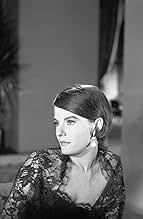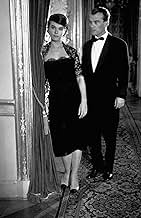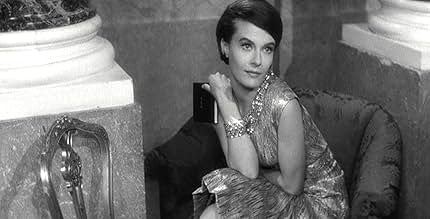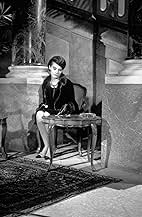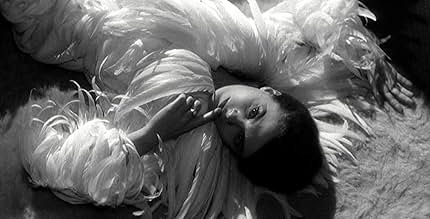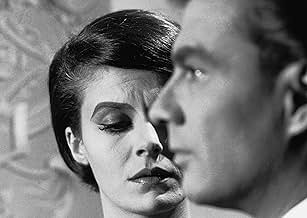CALIFICACIÓN DE IMDb
7.6/10
26 k
TU CALIFICACIÓN
En un extraño y aislado palacete, un hombre conoce a una mujer e intenta convencerla de que se ya se habían conocido antes.En un extraño y aislado palacete, un hombre conoce a una mujer e intenta convencerla de que se ya se habían conocido antes.En un extraño y aislado palacete, un hombre conoce a una mujer e intenta convencerla de que se ya se habían conocido antes.
- Dirección
- Guionista
- Elenco
- Nominado a 1 premio Óscar
- 2 premios ganados y 5 nominaciones en total
Karin Toeche-Mittler
- Un personnage de l'hôtel
- (as Karin Toche-Mittler)
Davide Montemurri
- Un personnage de l'hôtel
- (as Davide Montemuri)
Alan Edwards
- English Introduction
- (sin créditos)
- Dirección
- Guionista
- Todo el elenco y el equipo
- Producción, taquilla y más en IMDbPro
Opiniones destacadas
Human-like aliens on a earth-like planet in a parallel universe. Life forms consist of about 50 or so replicants living in a luxurious hotel. They speak French, wear tuxedos and evening gowns, but their emotions are all but drained. They're very stiff and robotic. No one is seen eating food although they're always making plans for dinner. They enjoy posing, especially in gardens.
The actual story involves a "rebel" known as X. He is the only one that exudes anything resembling human romantic desire. He takes a shine to a femalien known as A who is in residence with her lover/husband M. X realizes that M doesn't love A, so he feels it's alright to steal her away. All he had to do is convince A that she promised to go away with him a year ago and that she wanted one year to prepare. A doesn't remember the promise and X's efforts to convince her are like trying to unlock a door with a wet noodle. Love finally triumphs in the end as A eventually runs away with X in the night leaving M standing alone on the staircase with a blank expression.
The director, Alain Resnais, is firmly quoted as saying that the film has no meaning. However, with so many people arguing that the film is loading with symbolism and is indeed much like a game or puzzle to be solved, I interpreted the film in a way that entertains me the most. That's my story and I'm sticking to it.
Hope you like it.
The actual story involves a "rebel" known as X. He is the only one that exudes anything resembling human romantic desire. He takes a shine to a femalien known as A who is in residence with her lover/husband M. X realizes that M doesn't love A, so he feels it's alright to steal her away. All he had to do is convince A that she promised to go away with him a year ago and that she wanted one year to prepare. A doesn't remember the promise and X's efforts to convince her are like trying to unlock a door with a wet noodle. Love finally triumphs in the end as A eventually runs away with X in the night leaving M standing alone on the staircase with a blank expression.
The director, Alain Resnais, is firmly quoted as saying that the film has no meaning. However, with so many people arguing that the film is loading with symbolism and is indeed much like a game or puzzle to be solved, I interpreted the film in a way that entertains me the most. That's my story and I'm sticking to it.
Hope you like it.
10debblyst
It's useless to speculate on the "real" meaning of this dream-like movie that is an investigation on the mechanics of memory, and has the absolutely unique feature of allowing as many interpretations as there have been viewers since it opened to change cinematic grammar, decades ago. I've seen it 4 or 5 times over a span of some 25 years and still find it sumptuously directed, endlessly fascinating, eerie, one of my favorite movies of all time, and above all, an O-R-I-G-I-N-A-L !! Every movie ever made since "Marienbad" has a direct or indirect debt to it, as it abandoned (and subverted) objective story-telling tradition and entered the realm of total subjectivity, challenging movie audiences' intelligence, attention and perception. Of course, it's not meant for viewers who associate movies with light entertainment, though anyone who's ever wondered about his/her own mnemonic idiosyncrasies -- the diffuse, random, inaccurate way we recall facts and sometimes even mix them with imagined stuff -- surely COULD relate to this masterpiece.
There has been many conjectures as to the subject and the plot. Well, if you want a good hint, let me give you a precious one: read the novella "La Jalousie" (Jealousy, 1957), by Alain Robbe-Grillet, who is also the screenwriter of "Marienbad". "La Jalousie" is the thematic and "ideological" inspiration for "Marienbad".
Robbe-Grillet (one of the top names of the French "Nouveau Roman" movement along with Nathalie Sarraute, Marguerite Duras, Michel Butor, etc), was a former agronomist/ mathematician (and his writing shows it) who became a writer/filmmaker with a very personal, geometrical, unemotional, descriptive style. The novella "La Jalousie", like most Nouveau Roman books, is essentially cinematic in their approach of characters and plot, functioning like a film camera, a non-opinionated unobtrusive observer, but insightfully revealing in its "detachment".
His novella "La Jalousie" is a fascinating, maze-like circular construction, in which beginning and end mingle many times over, each time from a different perspective, just like observing a house or a sculpture from different angles one at a time -- which means each angle is only partially accurate, revealing but a portion of the truth, while hiding another. The "observer/narrator" in the book (the husband, but written in the third person - "he") tries to locate in PLACE and TIME the precise moment in which the feeling of jealousy arises in him as he tries to find the extent of his wife's relationship with another man (a.k.a. the threesome in the film). Did an affair really happen? Is it yet going to happen? Or is it his imagination, his suspicion, just his jealous feeling? (btw, this is the same theme as Proust's incomparable masterpiece "La Prisonnière", treated in antipodal, totally psychological, but equally obsessive style).
As in most "Nouveau Roman" novels, the notion of TIME in "La Jalousie" (and also in "Marienbad") is transformed and deformed; the approach of the characters is non-psychological, meaning that thoughts and outbursts of emotion are not dealt with, only the description of places, words, gestures and actions. Everything (even a very strong feeling like the birth of jealousy) is apprehended only through the observation of external facts: small gestures, the position of a chair or a table, a glass found full or empty, an unexpected sound, the way the woman combs her hair or looks at herself in the mirror, a suddenly unusual way of getting up or sitting down which leads to the husband's perception that something has suddenly, dangerously, definitely changed.
Well, it made very much sense to me that language-experimentalist book-worm Alain Resnais (think of all of his movies which were based on literature) and his fascination with memory and the brain (think "Hiroshima Mon Amour", "Je t'Aime Je t'Aime" and "Mon Oncle d'Amérique") should venture in constructing this film in visual terms using the geometrical structure of the novel (hence the breathtaking serpentine camera movements), with no beginning or end, respecting its "external", non-psychological, non-motivational approach of the characters and the plot, never condescending to "explanations".
See the film and read the book! I'm sure that, if you've liked (or been baffled by) the film on a first viewing, you'll have many insights on a second viewing of this absorbing, totally fascinating movie after reading the book on which it is structurally/esthetically based. While it's not essential to do so, it could be kind of a bonus! What else can I say? A definitive, revolutionary, undisputed film classic - 10/10
There has been many conjectures as to the subject and the plot. Well, if you want a good hint, let me give you a precious one: read the novella "La Jalousie" (Jealousy, 1957), by Alain Robbe-Grillet, who is also the screenwriter of "Marienbad". "La Jalousie" is the thematic and "ideological" inspiration for "Marienbad".
Robbe-Grillet (one of the top names of the French "Nouveau Roman" movement along with Nathalie Sarraute, Marguerite Duras, Michel Butor, etc), was a former agronomist/ mathematician (and his writing shows it) who became a writer/filmmaker with a very personal, geometrical, unemotional, descriptive style. The novella "La Jalousie", like most Nouveau Roman books, is essentially cinematic in their approach of characters and plot, functioning like a film camera, a non-opinionated unobtrusive observer, but insightfully revealing in its "detachment".
His novella "La Jalousie" is a fascinating, maze-like circular construction, in which beginning and end mingle many times over, each time from a different perspective, just like observing a house or a sculpture from different angles one at a time -- which means each angle is only partially accurate, revealing but a portion of the truth, while hiding another. The "observer/narrator" in the book (the husband, but written in the third person - "he") tries to locate in PLACE and TIME the precise moment in which the feeling of jealousy arises in him as he tries to find the extent of his wife's relationship with another man (a.k.a. the threesome in the film). Did an affair really happen? Is it yet going to happen? Or is it his imagination, his suspicion, just his jealous feeling? (btw, this is the same theme as Proust's incomparable masterpiece "La Prisonnière", treated in antipodal, totally psychological, but equally obsessive style).
As in most "Nouveau Roman" novels, the notion of TIME in "La Jalousie" (and also in "Marienbad") is transformed and deformed; the approach of the characters is non-psychological, meaning that thoughts and outbursts of emotion are not dealt with, only the description of places, words, gestures and actions. Everything (even a very strong feeling like the birth of jealousy) is apprehended only through the observation of external facts: small gestures, the position of a chair or a table, a glass found full or empty, an unexpected sound, the way the woman combs her hair or looks at herself in the mirror, a suddenly unusual way of getting up or sitting down which leads to the husband's perception that something has suddenly, dangerously, definitely changed.
Well, it made very much sense to me that language-experimentalist book-worm Alain Resnais (think of all of his movies which were based on literature) and his fascination with memory and the brain (think "Hiroshima Mon Amour", "Je t'Aime Je t'Aime" and "Mon Oncle d'Amérique") should venture in constructing this film in visual terms using the geometrical structure of the novel (hence the breathtaking serpentine camera movements), with no beginning or end, respecting its "external", non-psychological, non-motivational approach of the characters and the plot, never condescending to "explanations".
See the film and read the book! I'm sure that, if you've liked (or been baffled by) the film on a first viewing, you'll have many insights on a second viewing of this absorbing, totally fascinating movie after reading the book on which it is structurally/esthetically based. While it's not essential to do so, it could be kind of a bonus! What else can I say? A definitive, revolutionary, undisputed film classic - 10/10
Scenes at a European spa unfold while a man's mind tries to recollect a love affair of the past season. In one of the most deeply psychological films I have seen, memory itself seems to be the protagonist -- or is it the villain? What plot there is simply provides the material for a meditation on the uncertainty of knowing. The accomplishment of _Last Year at Marienbad_ is to make this point convincingly even in the case of that which one would not expect a man to have difficulty remembering: a sexual involvement and loss. It does so by a hypnotic combination of wheeling, dreamlike images of the resort's architecture and grounds, together with the incantatory, obsessive, recurrent tone of the narrative voice over. In doing this it also transforms a place where people go to be waited on and to play, into a labyrinth haunted by unsmiling shades, where remembering is both impossible and necessary.
This mysterious film shows us a man and a woman in an extravagant and capacious hotel. The man insists that he had an affair with the lady last year in Marienbad (or was it somewhere else?) The woman denies it, and just wants the man to leave her alone. Perhaps the man did meet her, perhaps he didn't. Resnais puts the pieces there and lets us take what we can from it.
The beautiful looking establishment, complete with gardens of splendour, is an eerie setting for the film. The guests seem like they are in a trance most of the time. A card game is shown where a man cannot be beaten, he claims. The cinematography is brilliant. Dark, then white, giving a blinking effect at times; and constantly switching between different locations. The music throughout the film sounds like it's from an old church organ. I can understand why this film will put off some people, because it doesn't explain much, and does meander at a pedestrian pace. But approached in the right mood, and watched in a dark room, this is a film to appreciate. Peter Greenaway thinks so; the film was influential in the making of The Draughtsman's Contract, and is (supposedly) the film Greenaway most admires.
The beautiful looking establishment, complete with gardens of splendour, is an eerie setting for the film. The guests seem like they are in a trance most of the time. A card game is shown where a man cannot be beaten, he claims. The cinematography is brilliant. Dark, then white, giving a blinking effect at times; and constantly switching between different locations. The music throughout the film sounds like it's from an old church organ. I can understand why this film will put off some people, because it doesn't explain much, and does meander at a pedestrian pace. But approached in the right mood, and watched in a dark room, this is a film to appreciate. Peter Greenaway thinks so; the film was influential in the making of The Draughtsman's Contract, and is (supposedly) the film Greenaway most admires.
My top 5: Alain Robbe-Grillet's "L'Imortelle" takes number 1 (by a landslide), and its a tie between David Lynch's Eraserhead & Blue Velvet for position 3, closely followed by Louis Buñuel's "Andalusian Dog" and Stan Brackage's "Dog Star Man" (which I would have rated number 1, except that I hated that so much I will not give it the satisfaction of being highly rated in any category!) and finally "Koyanisquatsi" which I defy any to explain or justify!
So - Last Year At Marienbad, in a nutshell, assume French Accent:
Verse 1: Man: I know you. Woman: You do not know me. Man: We were here. Woman: I was never here. Chorus: Man: Long strange monologue about the place that they are at, Marienbad. And how he has been here before and how she has been here before. Camera: panning about the ornate Marienbad mansion. Verse 2: (repeat verse 1 - add very interesting game of pick-up sticks) Chorus repeat verses 1 & 2
I think everyone should see this film. I don't know why. I have seen it numerous times. No, I have never seen it. Yes, I saw it last year! No, last year I did not see it. Yes, I saw it here, with me. Wait, I'm alone. Who am I talking to?
So - Last Year At Marienbad, in a nutshell, assume French Accent:
Verse 1: Man: I know you. Woman: You do not know me. Man: We were here. Woman: I was never here. Chorus: Man: Long strange monologue about the place that they are at, Marienbad. And how he has been here before and how she has been here before. Camera: panning about the ornate Marienbad mansion. Verse 2: (repeat verse 1 - add very interesting game of pick-up sticks) Chorus repeat verses 1 & 2
I think everyone should see this film. I don't know why. I have seen it numerous times. No, I have never seen it. Yes, I saw it last year! No, last year I did not see it. Yes, I saw it here, with me. Wait, I'm alone. Who am I talking to?
¿Sabías que…?
- TriviaThe match game in the movie is named as "Nim". In order to win the game there is only one tactic including a system called "Nim Sum". If both players use this tactic perfectly, then the owner of the first move will eventually lose. Due to the same reason, it is always disadvantageous to start the game first.
- ErroresExterior night scenes were shot day-for-night, but the sky and reflections of it were allowed in the frame, and they appear as bright white instead of black. This may have been intentional to emphasize the surreality of the film.
- Citas
[X wanders through the hotel's corridors cataloging items he sees]
X: Empty salons. Corridors. Salons. Doors. Doors. Salons. Empty chairs, deep armchairs, thick carpets. Heavy hangings. Stairs, steps. Steps, one after the other. Glass objects, objects still intact, empty glasses. A glass that falls, three, two, one, zero. Glass partition, letters.
- ConexionesFeatured in Fejezetek a film történetéböl: A francia új hullám (1990)
Selecciones populares
Inicia sesión para calificar y agrega a la lista de videos para obtener recomendaciones personalizadas
- How long is Last Year at Marienbad?Con tecnología de Alexa
Detalles
- Fecha de lanzamiento
- Países de origen
- Sitio oficial
- Idioma
- También se conoce como
- Last Year at Marienbad
- Locaciones de filmación
- Productoras
- Ver más créditos de la compañía en IMDbPro
Taquilla
- Total en EE. UU. y Canadá
- USD 207,917
- Fin de semana de estreno en EE. UU. y Canadá
- USD 15,485
- 20 ene 2008
- Total a nivel mundial
- USD 223,111
- Tiempo de ejecución1 hora 34 minutos
- Color
- Mezcla de sonido
- Relación de aspecto
- 2.35 : 1
Contribuir a esta página
Sugiere una edición o agrega el contenido que falta

Principales brechas de datos
What is the Canadian French language plot outline for El año pasado en Marienbad (1961)?
Responda


